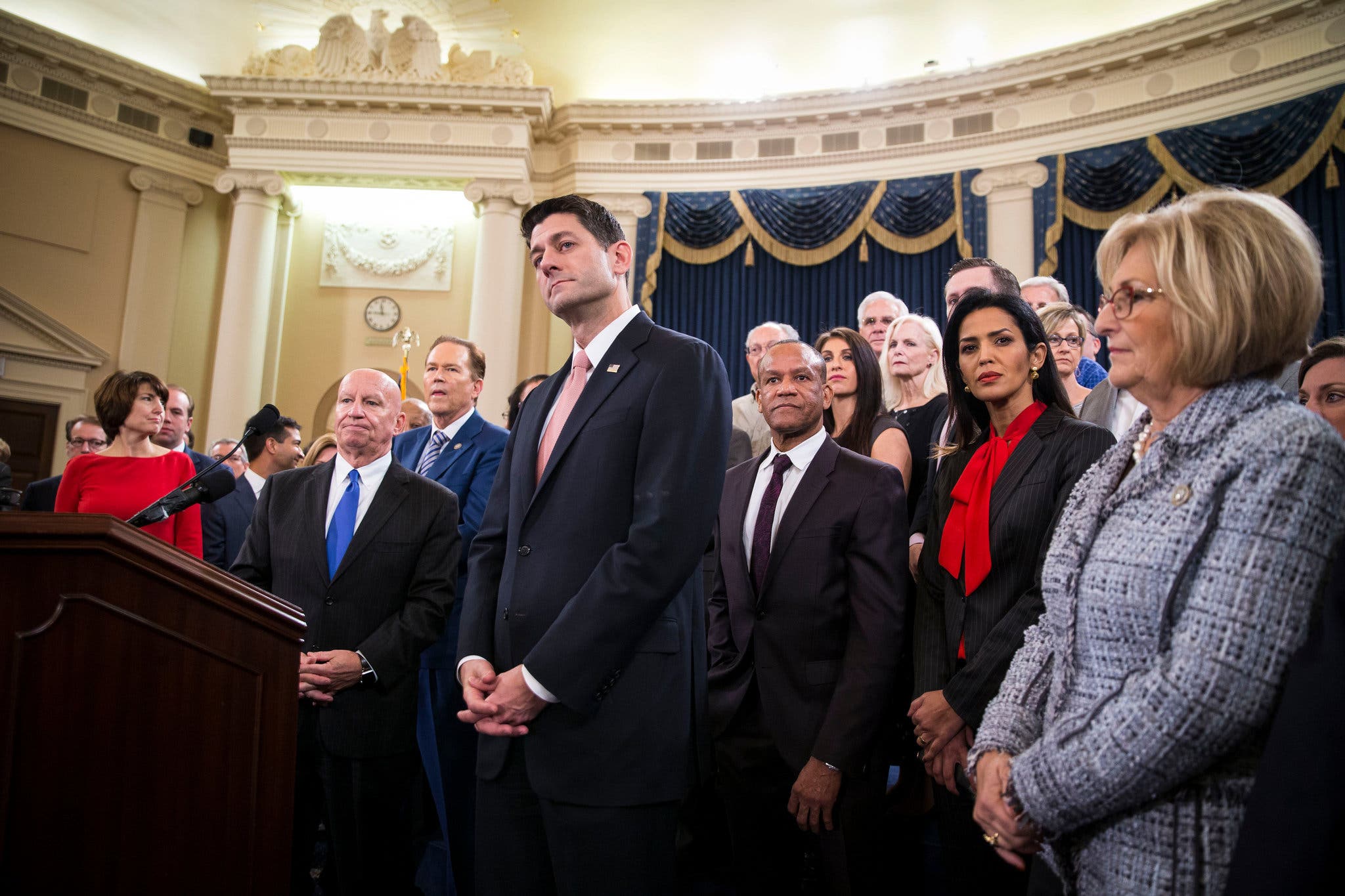Republican Divisions Could Determine Fate Of Trump's Tax Plan

Table of Contents
The Moderate Republican Revolt
Moderate Republicans are expressing significant reservations about the Trump administration's tax plan, raising concerns that could ultimately sink the legislation. These concerns stem from two primary sources: anxieties about the national debt and criticisms of the plan's disproportionate benefits for the wealthy.
Concerns over the National Debt
Moderate Republicans are deeply worried about the long-term fiscal impact of the proposed tax cuts. They argue that the significant reductions in revenue will dramatically increase the national debt, jeopardizing the nation's economic future.
- Proposed Cuts and Projected Costs: The plan includes substantial cuts to corporate tax rates (from 35% to 21%), individual income tax rates, and various deductions. The Congressional Budget Office (CBO) projects these cuts will add trillions to the national debt over the next decade.
- Statements from Moderate Republicans: Prominent figures like Senator Susan Collins have publicly voiced their concerns, emphasizing the need for fiscal responsibility and expressing skepticism about the plan's long-term sustainability. Others have echoed these sentiments, highlighting the potential for negative impacts on credit ratings and future economic growth.
- Impact on Credit Ratings and Economic Growth: The increased national debt could lead to a downgrade in the United States' credit rating, increasing borrowing costs for the government and potentially slowing economic growth. This concern is central to the moderate Republicans' opposition. The keywords "fiscal responsibility," "national debt," and "budget deficit" are critical to understanding this facet of the debate.
Tax Cuts for the Wealthy
Another major source of contention among moderate Republicans is the perceived inequity of the tax cuts. Critics argue that the plan disproportionately benefits high-income earners and corporations at the expense of the middle class and low-income individuals.
- Statistical Data Comparing Tax Cuts: Analyses show that the top 1% of income earners will receive a significantly larger percentage of the tax cuts than lower-income brackets. This disparity fuels concerns about income inequality.
- Specific Provisions Favoring the Wealthy: Provisions such as the reduction in the corporate tax rate and the elimination of certain deductions disproportionately benefit wealthy individuals and corporations.
- Contribution to Intra-Party Conflict: This perceived unfairness is a key driver of the intra-party conflict. The keywords "income inequality," "tax loopholes," and "wealth distribution" accurately represent this point of contention.
The Conservative Faction's Demands
While moderate Republicans worry about the potential downsides of the tax plan, the conservative wing argues that it doesn't go far enough. Their demands add another layer of complexity to the already precarious situation.
Insufficient Tax Cuts
Conservative Republicans believe the proposed tax cuts are insufficient to stimulate economic growth and argue for even more drastic reductions. They advocate for a more radical approach rooted in supply-side economics.
- Areas Where Conservatives Want Deeper Cuts: Conservatives want deeper cuts to individual income tax rates, further reductions in corporate taxes, and the elimination of more tax loopholes.
- Influential Conservative Figures and Their Positions: Key figures like Senator Ted Cruz have publicly championed these positions, arguing for a more aggressive approach to tax reform.
- Potential Complications and Amendments: These demands could lead to further complications, requiring significant amendments and potentially jeopardizing the entire plan's passage. Keywords like "supply-side economics," "tax simplification," and "deregulation" are essential for understanding the conservative perspective.
Opposition to Certain Spending Provisions
Adding to the complexity, some conservatives oppose specific spending measures included in the tax plan, even though they are ostensibly from the same party. This internal disagreement further undermines the unity needed to pass the legislation.
- Specific Spending Provisions Causing Friction: Certain spending provisions, potentially related to entitlement programs or infrastructure spending, are facing resistance from fiscal conservatives within the Republican party.
- Arguments Against Spending Provisions: Conservatives argue that these provisions contradict their principles of fiscal conservatism and could exacerbate the national debt.
- Potential for Negotiations and Compromises (or Failure): These differences could lead to protracted negotiations, potential compromises, or, ultimately, the complete failure of the tax plan. Keywords such as "government spending," "fiscal conservatism," and "entitlement programs" accurately capture this aspect of the debate.
The Role of the Trump Administration
The Trump administration plays a crucial role in navigating these internal conflicts. Its success in negotiating a compromise will be critical in determining the fate of the tax plan.
Negotiating the Divisions
The administration faces the formidable task of appeasing both moderate and conservative factions within the Republican party.
- Strategies Used to Appease Different Factions: The administration might employ various strategies, including targeted concessions or promises of future legislative action.
- Potential for Compromises and Concessions: The administration might be forced to make compromises on certain provisions to secure the necessary votes.
- Effectiveness of the President's Approach and Potential Outcomes: The effectiveness of these strategies will significantly impact the outcome of the legislative process. Keywords like "political negotiation," "legislative strategy," and "party unity" are crucial to understanding this aspect of the situation.
Potential Consequences of Failure
The failure of Trump's tax plan would have significant political ramifications.
- Impact on the President's Agenda and the Republican Party's Image: Failure would be a major setback for the President's legislative agenda and could damage the Republican party's image.
- Potential Effect on Upcoming Elections: The failure could negatively impact the Republican party's performance in upcoming midterm elections.
- Possible Alternative Legislative Strategies and Their Implications: The administration might explore alternative strategies to achieve its tax goals, but these might face similar obstacles. Keywords like "political fallout," "midterm elections," and "legislative agenda" effectively convey the potential consequences.
Conclusion
The fate of Trump's tax plan hinges on the Republican party's ability to overcome its profound internal divisions. The clash between moderate concerns about the national debt and income inequality and the conservative desire for deeper cuts and opposition to certain spending provisions presents a significant challenge. The Trump administration's success in bridging this divide will be crucial in determining whether this ambitious legislative effort succeeds or fails. Understanding these Republican divisions is key to comprehending the future of this pivotal legislation. Stay informed about the evolving situation and the ongoing impact of Republican divisions on Trump's tax plan.

Featured Posts
-
 Chinas Huawei Unveils New Ai Chip Technology
Apr 29, 2025
Chinas Huawei Unveils New Ai Chip Technology
Apr 29, 2025 -
 Austin City Limits Celebrating Willie Nelson And Familys Legacy
Apr 29, 2025
Austin City Limits Celebrating Willie Nelson And Familys Legacy
Apr 29, 2025 -
 Chat Gpt And Open Ai Face Ftc Investigation Key Questions Answered
Apr 29, 2025
Chat Gpt And Open Ai Face Ftc Investigation Key Questions Answered
Apr 29, 2025 -
 Country Legend Willie Nelson Releases Oh What A Beautiful World
Apr 29, 2025
Country Legend Willie Nelson Releases Oh What A Beautiful World
Apr 29, 2025 -
 Trumps Tariffs Goldman Sachs Provides Exclusive Advice To Affected Nations
Apr 29, 2025
Trumps Tariffs Goldman Sachs Provides Exclusive Advice To Affected Nations
Apr 29, 2025
Latest Posts
-
 Country Legend Willie Nelson Releases Oh What A Beautiful World
Apr 29, 2025
Country Legend Willie Nelson Releases Oh What A Beautiful World
Apr 29, 2025 -
 New Music Willie Nelson Releases 77th Solo Album At 91
Apr 29, 2025
New Music Willie Nelson Releases 77th Solo Album At 91
Apr 29, 2025 -
 New Music Willie Nelsons Oh What A Beautiful World
Apr 29, 2025
New Music Willie Nelsons Oh What A Beautiful World
Apr 29, 2025 -
 Oh What A Beautiful World Willie Nelsons Latest Album Details
Apr 29, 2025
Oh What A Beautiful World Willie Nelsons Latest Album Details
Apr 29, 2025 -
 Willie Nelson Drops New Album Before Turning 92
Apr 29, 2025
Willie Nelson Drops New Album Before Turning 92
Apr 29, 2025
